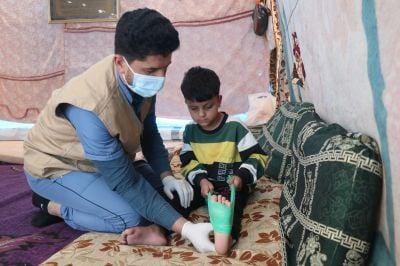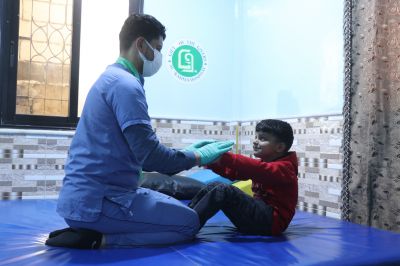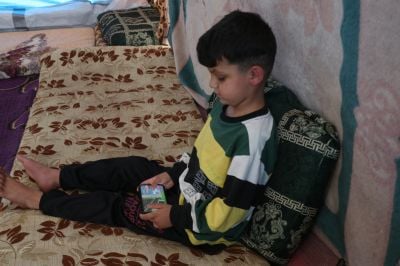The consequences of the earthquake
On 6 February, Ayham's life was shattered by the devastating earthquake that hit Syria and Turkey. His house in Azmarin, a town in northwestern Syria, was destroyed and he remained trapped under the rubble for four hours before the rescue teams reached him. He was the only member of his family to survive.
Ayham suffered a fractured right thigh, soft tissue injuries, contusions and several abrasions and wounds to his body and head. He was immediately transferred to the nearest hospital.
Early intervention by the rehabilitation teams
 The rehabilitation and psychological support teams rapidly took him in hand, providing him with much needed care and medical equipment (bed, dressings, walker, etc.).
The rehabilitation and psychological support teams rapidly took him in hand, providing him with much needed care and medical equipment (bed, dressings, walker, etc.).
By intervening early, they sought to prevent the onset of complications and improve and accelerate Ayham’s recovery.
The short-term objectives were to treat his wounds, reduce the swelling by elevating his legs above his heart, provide him with medication regularly and teach his grandmother positions and movements such as how to turn him over in bed so that she could help take care of him.
After about four weeks in hospital, Ayham was transferred to the Al-Rahma Health Centre in Darkoush to begin his rehabilitation sessions. The objective at this stage was to help him recover full functional autonomy and walk 200 metres without the help of mobility aids.
 Ayham did various exercises with resistance bands to strengthen his upper limbs, trunk and left lower limbs. He also did exercises to increase the control and command of his torso, such as the bridge exercise that improves movement and mobility.
Ayham did various exercises with resistance bands to strengthen his upper limbs, trunk and left lower limbs. He also did exercises to increase the control and command of his torso, such as the bridge exercise that improves movement and mobility.
Psychological support sessions
Ayham was deeply traumatised by everything that happened to him. However, by including his grandmother in his care, the teams were able to alleviate his fears and get him to accept physical therapy and join in therapeutic activities. Without encouragement, patients often tend to lose their motivation.
Ayham is missing the company of other children
Ayham has no children of his own age to play with at the moment, which he finds hard, and spends most of his time with his grandmother. But his health is good. He is now able to walk without assistance, his joint range of motion is normal, his muscle strength is back to what it used to be and he is able to squat, walk, go up and down stairs on his own, as well as jog and do most daily activities.
"Financially, the situation is bad. We live in a place where basic necessities are not available," explains his grandmother.
Ayham loves to spend time playing on his grandmother's phone and listening to children's songs on YouTube. He likes being with his grandmother, but he really wants to go back to school. Unfortunately, it is too far away. Ayham and his grandmother hope that one day it will be possible aga





